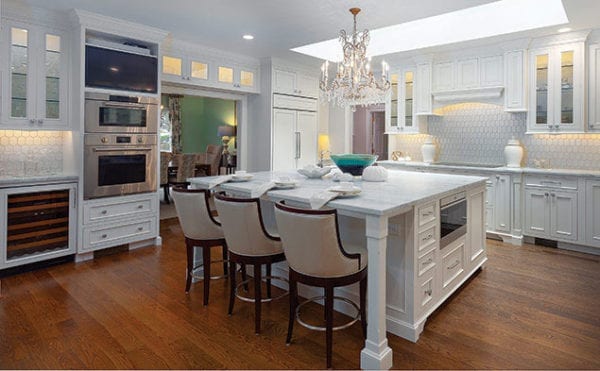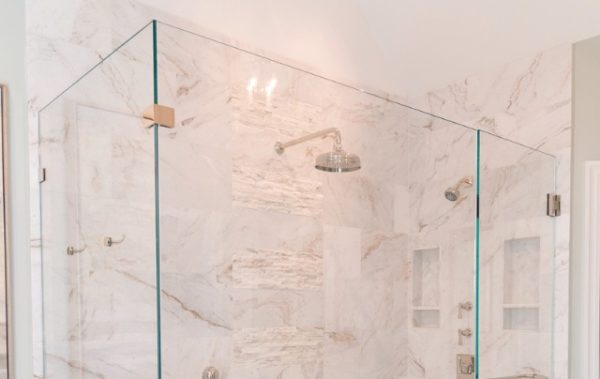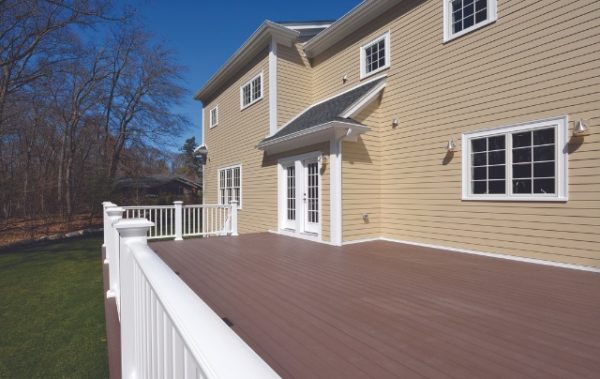Down the Drain

|
|
Next time you take a shower, start the dishwasher or drop carrot tops into your garbage disposal, listen closely. You probably hear a familiar gurgling under your feet. We know that clean water comes up and dirty water goes down, but how much do you really know about your plumbing system?
Although it surrounds us in our homes, many of us dont pay much attention to our plumbing. Its complicated, boring and not the most pleasant thing to deal with, right? Actually, the basics of plumbing systems are fairly easy to understand, and if you know whats going on behind your walls and under your floor, you may be able to help prevent plumbing disasters in your home.
According to David George, owner of Mainline Plumbing, one of the most important things homeowners should know about their plumbing is its condition. A plumbing professional can usually do a whole-house inspection for less than $150 and evaluate the plumbing, he says. At that point, homeowners can decide what to do themselves or what they need to outsource. As with all the utilities in your home, the first step in knowing how to deal with your plumbing is knowing how it works.
|
TOILET |
Carried away
The basic network of drainpipes that snake through your home is known as the drain-waste-vent (DWV) system. It connects to every sink, toilet, shower, bathtub, dishwasher and washing machine in your house, and it is responsible for transporting used water and waste from your home to the sewer or septic system. This is the out system of pipes, completely separate from the pipes that bring water into the home. Most metro Atlantans are connected to the city sewer system, which requires little attention from the homeowner. Septic tanks, on the other hand, require more maintenance.
Most up-to-date DWV systems use rigid plastic PVC or ABS pipes sealed with a special glue, while older homes may have cast-iron pipes sealed with lead solder. Old cast iron [25-30 years] frequently rusts and leaks, says David Crewey, owner of AmeriPro Plumbing in Snellville. New cast-iron pipes are quieter when draining but expensive to install. If you do have old cast-iron pipes, have a professional check themit may be time to replace them. Plastic pipes usually are louder when draining, but because they are less expensive, they are the pipes most commonly used in new construction.
The main component of the DWV system is the soil stack. It consists of a vertical stack of pipes that usually comes together in the basement or a first-floor wall, where it is connected to the sewer or septic line, which runs out of the house. Gases escape through the stacks vent, which runs out through the roof. The vent pipe also draws some air inward, which leads to proper drain flow within the system. Its important to keep the vent clear; if it is clogged, it will inhibit drainage and could cause dangerous gases to be trapped in the pipes.
Keeping gases (and odors!) from entering the home through drains is the job of one of the simplest but most important components of your plumbing systemthe trap. The trap is that U-shaped pipe located below each drain in your home. Its curved so that it will trap a small amount of water in its bend. That way, while water can still flow freely through the pipe, gasses are unable to flow up the pipe and enter the home through the drain. Its imperative that each drain in the homefrom the kitchen sink to the washing machinehas a trap.
|
LEAKAGE |
Water, water everywhere
Unless you live in a rural area, your water most likely is supplied through the city water main. Private wells are typically found only where city water is unavailable, and, other than saving you the cost of city or county water, they offer no real advantages over city water. A disadvantage is the hardness of well water, says Ken Haines, president of Mr. Plumber in Atlanta. An abundance of minerals can cause corrosion of copper plumbing lines, water heaters and fixtures. Water pressure is typically lower coming from wells, too.
For most metro Atlantans, city water enters the home through a live water supply line. This connects to a city water main and a water meter, which is the dividing point between the homeowners water lines and the city lines. County and city water services are maintained by their respective local providers, Crewey says. Water generally enters the home through the basement floor or a first-floor wall. Cold water comes from pipes that branch off from the main line, while hot water comes from lines that go directly through the water heater.
Its important to be able to turn off the water in case of emergency. Know where the main water shut-off valve is located inside the house and the location of the outside main, Haines says. The main water valve can be difficult to find, so ask your plumber to make sure its clearly marked on his next inspection.
The pipes that carry water into your home are usually between half an inch and an inch in diameter. These pipes typically are made from copper. This is the preferred choice, Haines says. Although copper pipes are the most expensive, they are also the most reliable. Galvanized was the standard for many years, but it will rust from the inside, discoloring the water and eventually creating leaks or restriction in the water flow, Crewey says. If you have galvanized pipes, its a good idea to have them inspectedit may be time to revamp your pipe system. Some homes contain CPVC pipes, which are easier to install and repair, but are generally not as high-quality as copper pipes. CPVC pipes do work best with well water, though, because they wont corrode like copper when exposed to all the minerals found in well water.
If you see discolored water coming from your faucets, call a plumber immediately to find the source of the grime, for which there are several possible causes. Discolored water can be coming from corroded galvanized pipes, the water heater could be producing rust or a line could be broken outside in the yard, drawing in mud or clay, George says.
|
GARBAGE |
Calling in reinforcements
If you do encounter a snafu in your plumbing, whether its discolored water, leaky pipes or water heater issues, dont hesitate to call a professional. You may be tempted to try your own hand at fixing your plumbing, but if its anything more than a clogged drain, you may have trouble. We frequently get calls from homeowners frustrated with do-it-yourself projects because they dont have the right tools for the job, it takes a bit of muscle power to do some of the work and plumbing can get messy, George says. In addition to being frustrating, trying to fix problems in your pipes can be tricky, and if you start taking things apart, you run the risk of violating Georgia plumbing codes. Codebooks can be purchased online, but they are really intended for plumbing professionals and are difficult to interpret. Your best bet is to call in reinforcements.
For help finding a licensed plumber, try checking the State of Georgias Web site (www.sos.state.ga.us), the Plumbing & Mechanical Association of Georgia (www.plumbingpros.com) or the Better Business Bureau. Also check our resource guide on page 175 and editorial resources on page 188. However you decide to choose, make sure you keep a couple of emergency plumbing numbers near your phoneits always good to have backup when a plumbing crisis strikes!

Tips for a Successful Remodeling Project

40TH Annual Spring Atlanta Home Show

Atlanta Home Improvement Magazine 2012 Before and After Projects Contest Entries

Award-Winning Kitchens, Baths, Interior Design and More

Atlanta’s NKBA Designs of Distinction 2019 Winners

100 Things to Know Before You Remodel

What’s the simplest way to upgrade your window treatments?











